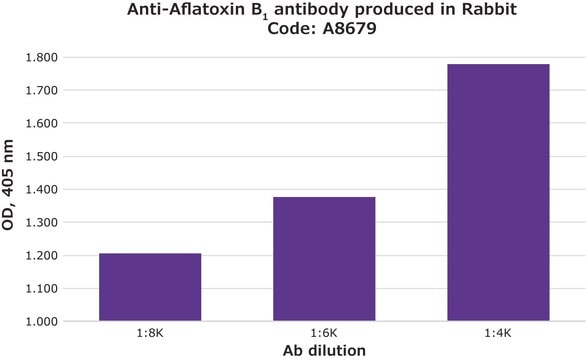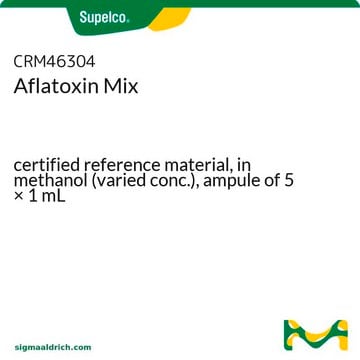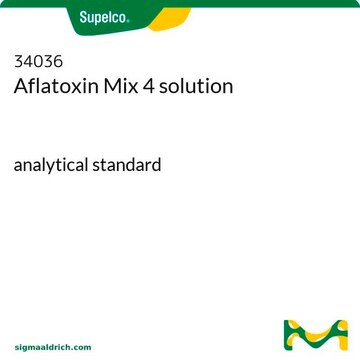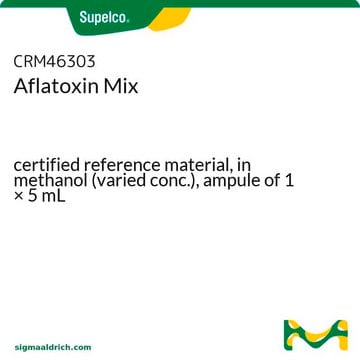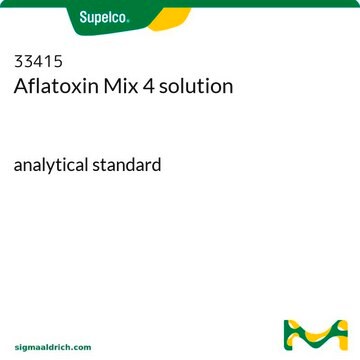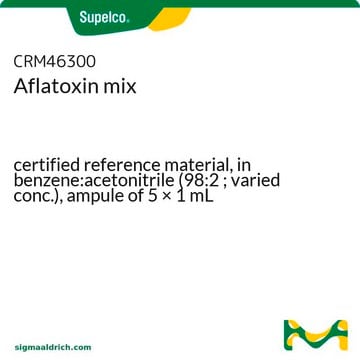A9555
Monoclonal Anti-Aflatoxin B1 (G1, Q1, B2, G2) antibody produced in mouse
clone AT-B1, ascites fluid
Sign Into View Organizational & Contract Pricing
All Photos(1)
About This Item
Recommended Products
biological source
mouse
Quality Level
conjugate
unconjugated
antibody form
ascites fluid
antibody product type
primary antibodies
clone
AT-B1, monoclonal
contains
15 mM sodium azide
technique(s)
ELISA: 1:20,000 using aflatoxin B1-BSA
isotype
IgG1
shipped in
dry ice
storage temp.
−20°C
target post-translational modification
unmodified
General description
Monoclonal anti-Aflatoxin B (mouse IgG1 isotype) is 1 derived from the hybridoma produced by the fusion of mouse myeloma cells and splenocytes from an immunized mouse.Aflatoxins are a group of naturally occurring fungal toxins (mycotoxins) synthesized by Aspergillus flavus and Aspergillus parasiticus. It is found as contaminants in human and animal food such as corn, peanuts, tree nuts, cottonseed, cereal crops, beans, casssava, milo, sorghum, copra, rice, dried fish and beer.
Immunogen
aflatoxin B -KLH conjugate
Application
Monoclonal Anti-Aflatoxin B1 (G1, Q1, B2, G2) antibody produced in mouse has been used in indirect enzyme linked immunosorbent assay (ELISA) and fluorescence polarization assay.
Biochem/physiol Actions
Aflatoxin B (AFB) and its metabolites is known to act as potent carcinogens, mutagens and teratogens, in addition to its toxicity. Aflatoxins have been implicated in human hepatocellular carcinoma, outbreaks of aflatoxicosis, Rey′s syndrome, chronic hepatitis and increased mortality from infection in animal husbandry.
Target description
Mycotoxins, a group of chemically diverse secondary fungal metabolites, induce a variety of toxic responses in humans and animals when food and feed containing these compounds are ingested. Rapidly quantitating levels of mycotoxin contamination can help reduce exposure to these toxins.
Disclaimer
Unless otherwise stated in our catalog or other company documentation accompanying the product(s), our products are intended for research use only and are not to be used for any other purpose, which includes but is not limited to, unauthorized commercial uses, in vitro diagnostic uses, ex vivo or in vivo therapeutic uses or any type of consumption or application to humans or animals.
Not finding the right product?
Try our Product Selector Tool.
Storage Class Code
10 - Combustible liquids
WGK
WGK 3
Flash Point(F)
Not applicable
Flash Point(C)
Not applicable
Certificates of Analysis (COA)
Search for Certificates of Analysis (COA) by entering the products Lot/Batch Number. Lot and Batch Numbers can be found on a product’s label following the words ‘Lot’ or ‘Batch’.
Already Own This Product?
Find documentation for the products that you have recently purchased in the Document Library.
Customers Also Viewed
Robert J Lee et al.
Scientific reports, 6, 33221-33221 (2016-09-15)
Aflatoxins are mycotoxins secreted by Aspergillus flavus, which can colonize the respiratory tract and cause fungal rhinosinusitis or bronchopulmonary aspergillosis. A. flavus is the second leading cause of invasive aspergillosis worldwide. Because many respiratory pathogens secrete toxins to impair mucociliary
Physicochemical and immunological characterization of chitosan-coated bacteriophage nanoparticles for in vivo mycotoxin modeling
de Andrade CYT, et al.
Carbohydrate Polymers, 185, 63-72 (2018)
Screening of Lactobacillus casei strains for their ability to bind aflatoxin B1
Hernandez MA, et al.
Food And Chemical Toxicology, 47(6), 1064-1068 (2009)
Frances A Draughon et al.
Journal of food protection, 45(8), 703-706 (1982-06-01)
Aflatoxin B1 was mixed with eleven concentrations of sodium hydroxide, sodium hypochlorite and ammonium hydroxide. Aflatoxin was quantitated by fluorometric determination and toxicity of aflatoxin treated with NaOH and NH4OH was evaluated by the brine shrimp assay. Detoxified aflatoxin B1
Mycotoxins
Bennett JW, et al.
Clinical Microbiology Reviews, 16(3), 497-497 (2003)
Our team of scientists has experience in all areas of research including Life Science, Material Science, Chemical Synthesis, Chromatography, Analytical and many others.
Contact Technical Service
